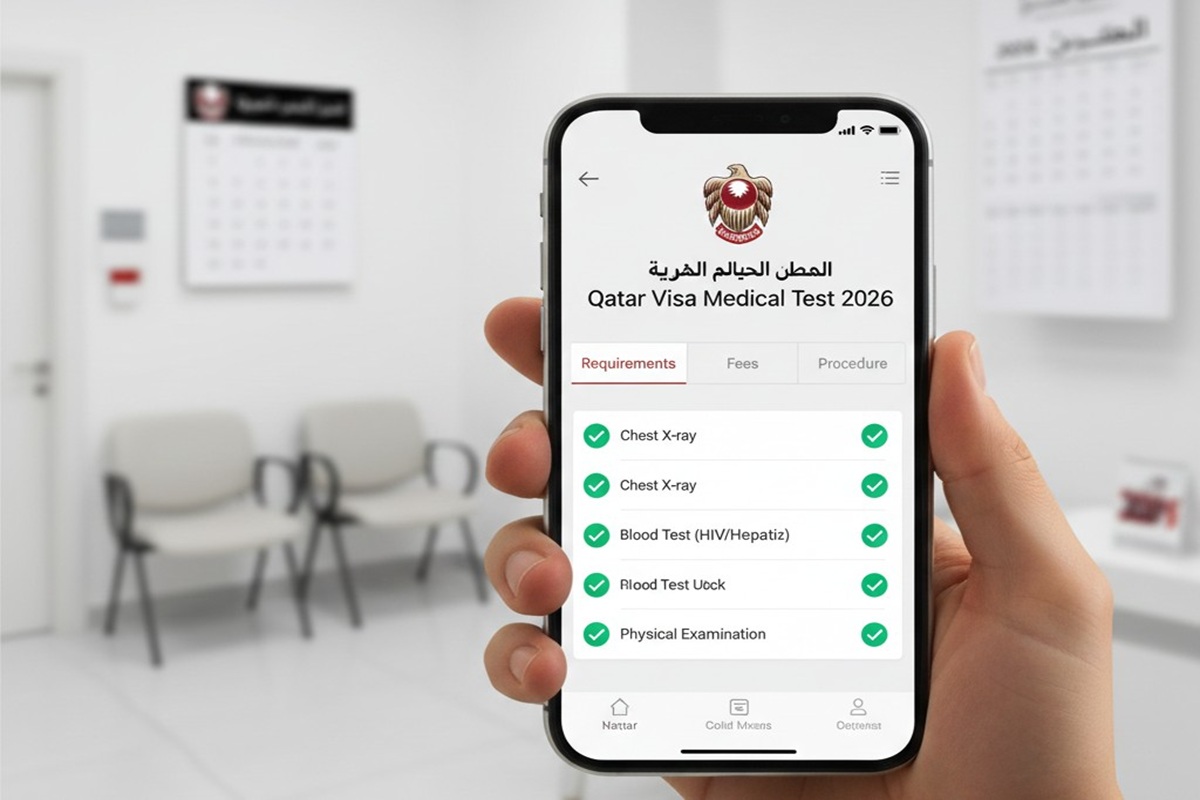Key Takeaways
- Qatar requires a medical fitness test for many visa types — especially work visas and family residence permits.
- Costs vary: for family residence visas, the fee is about QAR 100, while QVC (pre-entry) medicals can go up to QAR 290 depending on your country.
- The exam includes blood tests (HIV, Hep B/C, syphilis), a chest X-ray, and basic physicals.
- Results typically take 24–72 hours, and are shared via SMS, the Ministry of Public Health portal, or via QVC systems.
What Is the Qatar Visa Medical Test & Why It Matters
For many visa applicants — especially those applying for a residence permit (RP) or work visa — Qatar requires a medical fitness test. This ensures public health standards and screens for certain infectious diseases.
If you’re applying from abroad, the test is often done via QVC (Qatar Visa Centers) in your home country.
If you’re already in Qatar (for example, on a visit visa or for family residency), you usually take the test at the Qatar Medical Commission.
What’s Tested: Requirements of the Medical Test
When you go for your visa medical, here’s what you’ll typically be checked for:
- Physical exam — Height, weight, vital signs, medical history.
- Chest X-ray — To screen for tuberculosis.
- Blood tests — HIV, Hepatitis B, Hepatitis C, and syphilis (VDRL).
- Other lab work — Biochemistry (e.g. blood sugar, liver enzymes), hemoglobin, possibly a pregnancy test for women.
- Vision / general health check — Also part of the assessment.
How Much Does It Cost (2026)
Here’s a breakdown by visa-type / where the test is done:
| Visa Type / Scenario | Fee (QAR) / Approx. Cost |
|---|---|
| Family Residence Permit (in Qatar) | ~ QAR 100 per person. |
| Work Visa Medical (via QVC / GAMCA) | Varies by country / center. But as per QVC, standard test ~ QAR 290. |
| Additional tests / re-tests | May cost more; depends on center and what’s needed. |
Note: For family RP tests in Qatar, payment is done by card only — cash is not accepted.
The Step-by-Step Procedure
Here’s what the process typically looks like, depending on your situation.
Scenario A: Applying from Outside Qatar via QVC
- Book an appointment at your nearest Qatar Visa Center (QVC) / GAMCA center.
- Go for the test: Bring your passport, visa / appointment confirmation, and any required forms.
- Undergo the medical exam: blood samples, X-ray, physical.
- Wait for results: Usually within 72 hours but could be faster.
- Check results: Use QVC’s “Track Application” system with your passport or visa number.
- Use the certificate: Once passed, the medical certificate is used in your visa application to MOI.
Scenario B: Family or Visit Visa Medical inside Qatar
- Go to the Medical Commission: They have a center in Doha (Abu Hamour) and possibly other approved clinics.
- Bring required documents: Passport, visa copy, and video / proof of payment method (debit / credit card).
- Pay the fee: QAR 100, via card.
- Do the tests: Blood test, X-ray, physical check. For pregnant women, they may skip the X-ray if you show a pregnancy certificate.
- Receive results: Typically within 24–72 hours.
- You’ll often get an SMS (if your sponsor has Metrash), or
- You can check via the Ministry of Public Health (MoPH) website.
- Proceed to fingerprinting: Once medical is cleared, your sponsor can take you to MOI for the next steps.
Common Challenges & Tips
- Delays in results: Some people report waiting more than 48 hours. If your result doesn’t appear by day 3, follow up with MoPH or the medical commission.
- Card payment only: Bring a working credit or debit card. For family RP, they may issue a temporary card if you don’t have one.
- Dress code matters: For female applicants, ankle-length dresses or pants are usually required at the Medical Commission.
- Appealing unfit decisions: Some visa applicants (especially work visa) have reported being rejected due to latent TB or positive antibody tests. If you believe the result is wrong, you may request a retest or appeal via the medical center or with your sponsor.
Expert Analysis: What This Means for Applicants
- Barrier to entry: The medical test is more than a formality. For work visas, failing can block your contract and visa.
- Cost is modest but variable: For those doing tests inside Qatar, it’s fairly cheap (QAR 100), but for pre-entry medical via QVC, the rate depends heavily on your country.
- Health implications: Since the test includes infectious disease screening, it underscores Qatar’s strong public health policy for migrants.
- Administrative risk: Delays in test results or rejections can derail visa processing, so plan well. Use trusted clinics, and make sure all documents are correct.
FAQ
Usually, children under 15 are exempt from the full medical test for family residence visas.
For visit visa extensions, some sources say no medical test is required for children.
According to some sources, a QVC-issued certificate’s validity depends on the issuing country and medical center. But for in-Qatar tests, once passed and recorded in MOI, it’s valid for visa processing (check with MOI/sponsor for exact validity).
If minor, treatable issues show up (e.g. high blood pressure, mild infection), you’ll be advised to get treatment and retested.
During that pause, visa processing may be delayed until you pass.









